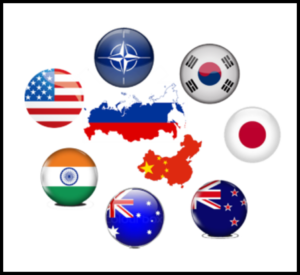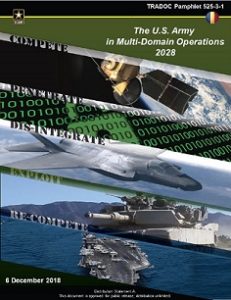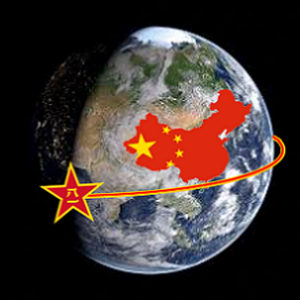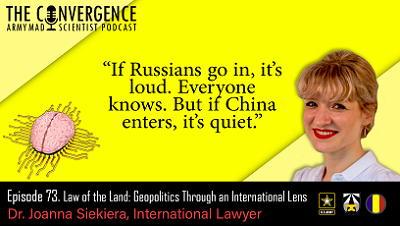[Editor’s Note: Army Mad Scientist is pleased to present our latest episode of The Convergence podcast, featuring Dr. Joanna Siekiera — an international lawyer specializing in Pacific law, maritime law, and the law of armed conflict — discussing the legal aspects of Multi-Domain Operations and the protection of civilians, what we can learn from the on-going war in Ukraine as it pertains to U.S. policy and legal implications, and her concerns about security and policy in the Indo-Pacific — Enjoy!]
[If the podcast dashboard is not rendering correctly for you, please click here to listen to the podcast.]
 Joanna Siekiera is an international lawyer and Doctor of Social Sciences in public policy sciences. She studied under a New Zealand Government scholarship at the Victoria University in Wellington. Her specialization is legal and political relations in the South Pacific, and the law of armed conflict. She is prodigious author, having written a book, co-authored three monographs, over 90 scientific publications in several languages, and over 40 legal analyses.
Joanna Siekiera is an international lawyer and Doctor of Social Sciences in public policy sciences. She studied under a New Zealand Government scholarship at the Victoria University in Wellington. Her specialization is legal and political relations in the South Pacific, and the law of armed conflict. She is prodigious author, having written a book, co-authored three monographs, over 90 scientific publications in several languages, and over 40 legal analyses.
In today’s podcast, we explore the legal aspects of Multi-Domain Operations and the protection of civilians, what we can learn from the on-going war in Ukraine as it pertains to U.S. policy and legal implications, and her concerns about security and policy in the Indo-Pacific. The following bullet points highlight key insights from our interview:
-
-
- Dr. Siekiera’s goal is to advise commanders on how to lawfully accomplish their military aims by understanding legal possibilities.
-
-
-
- Law is important, both as a discipline and within the context of society. Societal and cultural context help us to accurately analyze a conflict and understand the initial ideas and values that send countries to war, in order to respond appropriately and proportionally.
-
-
-
 There are no ethics in international law – one country’s system of values may not translate to another, creating differences in approaches to the law of armed conflict. Context and history can teach us why countries may see things differently and help to predict further actions.
There are no ethics in international law – one country’s system of values may not translate to another, creating differences in approaches to the law of armed conflict. Context and history can teach us why countries may see things differently and help to predict further actions.
-
-
-
- Dr. Siekiera uses the term
 s “East” and “West” not to divide but to make people aware that the two are not the same. Assuming that an adversary shares your cultural values is a dangerous and misleading bias — mirror-imaging — that threatens security. Alliances between nations are maintained when a shared identity is fostered.
s “East” and “West” not to divide but to make people aware that the two are not the same. Assuming that an adversary shares your cultural values is a dangerous and misleading bias — mirror-imaging — that threatens security. Alliances between nations are maintained when a shared identity is fostered.
- Dr. Siekiera uses the term
-
-
-
 The legal aspects of Multi-Domain Operations and the protection of civilians are not being treated with the requisite importance. Although international laws exist to protect civilians in armed conflicts, a nation that does not hold the same values cannot be relied upon to comply with these otherwise widely accepted humanitarian laws. This must be recognized when planning all aspects of military operations.
The legal aspects of Multi-Domain Operations and the protection of civilians are not being treated with the requisite importance. Although international laws exist to protect civilians in armed conflicts, a nation that does not hold the same values cannot be relied upon to comply with these otherwise widely accepted humanitarian laws. This must be recognized when planning all aspects of military operations.
-
-
-
 China – the biggest threat not only to western civilization but to NATO – slowly influences economic and societal changes in surrounding nations, quietly creating a military threat decades before it is recognized. Although NATO falls outside the Indo-Pacific region, China is still a threat through its influence in nearby nations.
China – the biggest threat not only to western civilization but to NATO – slowly influences economic and societal changes in surrounding nations, quietly creating a military threat decades before it is recognized. Although NATO falls outside the Indo-Pacific region, China is still a threat through its influence in nearby nations.
-

Stay tuned to the Mad Scientist Laboratory for our next episode of The Convergence on 9 March 2023 when we’ll discuss synchronizing modernization efforts across the U.S. Army with GEN Gary Brito, Commanding General, U.S. Army Training and Doctrine Command (TRADOC)!
If you enjoyed this post, check out the following related TRADOC G-2 and Mad Scientist content:
China Landing Zone content on the TRADOC G-2‘s Operational Environment Enterprise public facing page — including the BiteSize China weekly topics, ATP 7-100.3, Chinese Tactics, People’s Liberation Army Ground Forces Quick Reference Guide, and more!
The Operational Environment (2021-2030): Great Power Competition, Crisis, and Conflict, along with its source document
How China Fights and associated podcast
Your Adversary is Rational, Just Not the Way You Want Them to Be by LTC Nathan Colvin
Other People’s Wars: The US Military and the Challenge of Learning from Foreign Conflicts, with Brent L. Sterling, and associated podcast
Then and Now: Using the Past to Secure the Future by Warrant Officer Class 2 Paul Barnes, British Army
China: Building Regional Hegemony and China 2049: The Flight of a Particle Board Dragon, the comprehensive report from which this post was excerpted
The Most Consequential Adversaries and associated podcast, with GEN Charles A. Flynn
China’s PLA Modernization through the DOTMLPF-P Lens, by Dr. Jacob Barton
Competition in 2035: Anticipating Chinese Exploitation of Operational Environments
Disclaimer: The views expressed in this blog post and podcast do not necessarily reflect those of the U.S. Department of Defense, Department of the Army, Army Futures Command (AFC), or Training and Doctrine Command (TRADOC).



